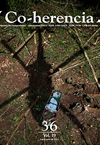Ethical Turn of Humanitarian Normativism: The Right to be Mourned
Main Article Content
Keywords
Public mourning, war, fear, pity, Judith Butler, Sigmund Freud
Abstract
Because of our intense desire to deny our own death when confronted with the death of others, our spiritual deflation presents an ethical and political opportunity, rather than an insurmountable obstacle, to think about and build other discourses and normative practices in the face of the destructiveness that we are capable of and are irremediably
exposed to anyway. Undoubtedly, the norms of apprehension and recognition of what is human depend, above all, on our affective dispositions when confronting the death of others, whose losses we judge, differentially, as meritorious or unworthy of being mourned, according to the value or lack of value we ascribe to their lives; hence, the importance of the right to be mourned as an ethical and political condition for the humanization of all. This article, based on Aeschylus, Sigmund Freud, and Judith Butler, comprises three sections: (1) the question of human destructiveness; (2) killable lives that are unworthy of mourning; and (3) the affective power of mourning.
Downloads
References
Butler, J. (2006). Detención indefinida. En Vida precaria. El poder del duelo y la violencia (F. Rodríguez, Trad; pp. 70-132). Paidós.
Butler, J. (2006). Vida precaria: El poder del duelo y la violencia (F. Rodríguez, Trad.). Paidós.
Butler, J. (2017). Marcos de guerra: Las vidas lloradas (B. Moreno Carrillo, Trad.). Paidós.
Butler, J. (2020). La fuerza de la no violencia (M. Mayer, Trad.). Paidós.
Esposito, R. (2009). Comunidad, inmunidad, biopolítica (A. García Ruiz, Trad.). Herder.
Esquilo. (2006). Los Persas (B. Perea Morales, Trad.). En Tragedias (pp. 1-49). Gredos.
Freud, S. (2012 [1915]). Consideraciones de actualidad sobre la guerra y la muerte. En El malestar en la cultura y otros escritos sobre violencia y sociedad (L. López-Ballesteros y de Torres, Trad.; pp. 13-45). RBA.
García Gual, C. (1995). Conmemoración trágica de un triunfo: los Persas de Esquilo (472 a. C.). Disparidades. Revista de Antropología, 50(2), 209-217 https://doi.org/10.3989/rdtp.1995.v50.i2.320
Grimal, P. (2008). Diccionario de mitología (F. Payarols, Trad.). Paidós.
Loraux, N. (2004). Madres en duelo (A. Iriarte Goñi, Trad.). Abada.
Nussbaum, M. (2003). La terapia del deseo: Teoría y práctica en la ética helenística (M. Candel Sanmartín, Trad.). Paidós.
Revault d’Allonnes, M. (2010). Lo que el hombre hace al hombre: Ensayo sobre el mal político (H. Pons, Trad.). Amorrortu.
Ruiz, A. y Solano, H. (2020). Soberanía y negación de la vida humana. Un análisis socio-político sobre el control del riesgo. Revista de Estudios Sociales, (72), 99-110. https://doi.org/10.7440/res72.2020.08
Weil, S. (1996). Echar raíces (J. C. González y J. R. Capella, Trads.). Trotta.





